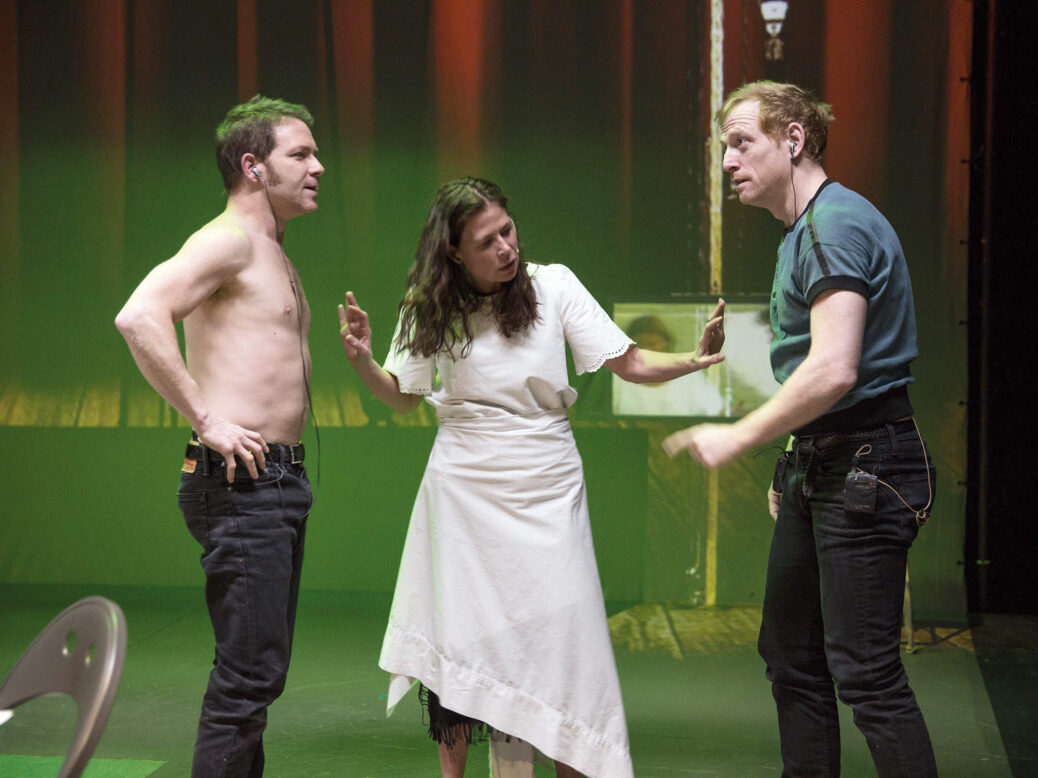
You haven’t really watched The Rocky Horror Picture Show until you’ve watched a Rocky Horror shadowcast. Richard O’Brien’s 1975 gender-bending musical is – let’s be honest – both bad and batshit insane, with its plot about a preppy couple sheltering from a storm inside the castle/laboratory of Dr Frank N Furter, a “sweet transvestite from transsexual Transylvania” who grows himself a hot boyfriend in a tank, only to be shot by his loyal hunchbacked butler who turns out to be an alien. Every time I watch it, I find myself imitating the woman on Gogglebox who lives in the caravan: “Oo wrote this?”
Rocky Horror has survived, however – and thrived, with a screening in 2015 in the Royal Albert Hall – because of the fandom that grew up around it. The film is gloriously queer, with Tim Curry’s Frank seducing both halves of the preppy couple on the same night, with exactly the same lines, and his lab-grown twink spending the entire film parading round in tiny gold hotpants and a Boris Johnson wig. (For those who prefer their men with more heft, Meat Loaf is also in it. He gets killed and eaten.)
And so it was embraced by fans who saw themselves as outsiders and misfits. At special “talkback” screenings, the audience would shout at the screen (every appearance of preppy Janet provokes a “slut”; clean-cut Brad is an “asshole”), throw rice while watching the wedding, and cover up with a newspaper when the couple get out of their car in the rain. Over the years, new interjections were added to the talkback repertoire – and in the days before the internet, these spread by word of mouth. Most of the phrases are filthy, but not all; when Brad takes off his glasses, it’s traditional to scream: “Superman!”
Shadowcasting takes this model a step further, with live actors playing out the scenes in front of the video feed; at the Clapham Grand on 23 June, I watched my friend Gia make a frighteningly convincing Frank, thanks to a curled lip and a binder under her corset. Rocky was played by a woman; Janet, sometimes, by a man. Everyone involved had put hours into faithfully recreating the original costumes and timing their gestures to match perfectly. It’s tempting to read shadowcasting as merely a fan’s cute way to love their object of desire harder: maybe, for one night, we can pretend to be inside the film itself? But it’s more than that. Shadowcasting takes an inert, finished product and makes it interactive and alive again. It starts a dialogue with the original. It creates a community. And it offers a chance to wear fishnets in public, even if you’re a 40-something accountant called Steve. (Perhaps particularly if you’re a 40-something accountant called Steve.)
Watching the Rocky Horror shadowcast made me rethink what I’d seen earlier that day, when I was ushered into a makeshift space inside the Barbican’s vast stage with a few folding chairs and functional tables in front of a video screen. The Town Hall Affair, by the experimental New York theatre ensemble the Wooster Group, similarly mashes up live performance and archive footage. In this case, the original text is a documentary about the 1971 debate between Norman Mailer, literary critic Diana Trilling and feminist activists Jill Johnston, Jacqueline Ceballos and Germaine Greer. It was preceded by Mailer writing a 50-page article about himself for Harper’s attacking the women’s movement, particularly its championing of (as he saw it) consequence-free sex by using contraceptives.
Two actors (Ari Fliakos and Scott Shepherd) play Mailer, suggesting both his physical and verbal pugnacity, and how he dominated the debate by appointing himself as moderator. Using original footage, the actors perform alongside their real-life doubles, even recreating the pauses and fumbles of the speeches from that night.
Again, it creates a dialogue between old and new: it’s hard to believe now how kittenish Greer (Maura Tierney) could be, delivering killer lines about the male ego while smouldering in a fox fur stole. (Younger feminists who have only ever seen her in batty aunt mode might understand her persona better once they see the hostile, patronising climate in which she made her name.) Trilling, who was praised in patronising tones by Mailer as a leading “lady critic”, is played by a male actor in a towering beehive. The giggling, hippyish Johnston – who believed that mass lesbianism was the only answer to patriarchy – reminds us of the revolutionary spirit of 1970s feminism, whose wilder envoys also called for the abolition of the nuclear family.
The obvious question about the Wooster Group’s practice is this: why not just watch the documentary everyone’s playing along to? But there’s something energising about the intercutting of debate with Johnston’s reflections on it and Mailer’s vanity project Maidstone, about a film director who runs for president. Not least because we now have permission to laugh at Mailer, in all his pomp and defensiveness, one minute ordering Johnston to keep to time, another sulkily threatening to “take out my modest little Jewish dick and put it on the table” for all the women to mock.
“There is an element of women’s liberation that terrifies me,” Mailer said on stage in 1971. “It terrifies me because it’s humourless.” The Town Hall Affair suggests what he was frightened of was something else: that among these fearsome women, he was no longer the joker, but the punchline.
The Town Hall Affair
The Wooster Group
Barbican, London EC2
This article appears in the 27 Jun 2018 issue of the New Statesman, Germany, alone





